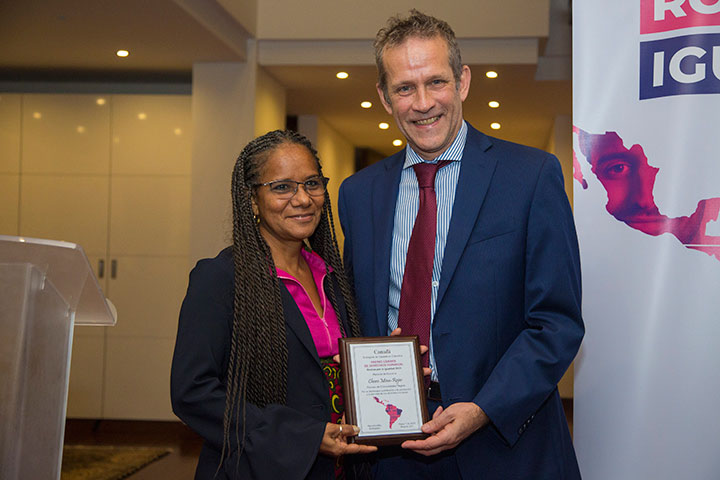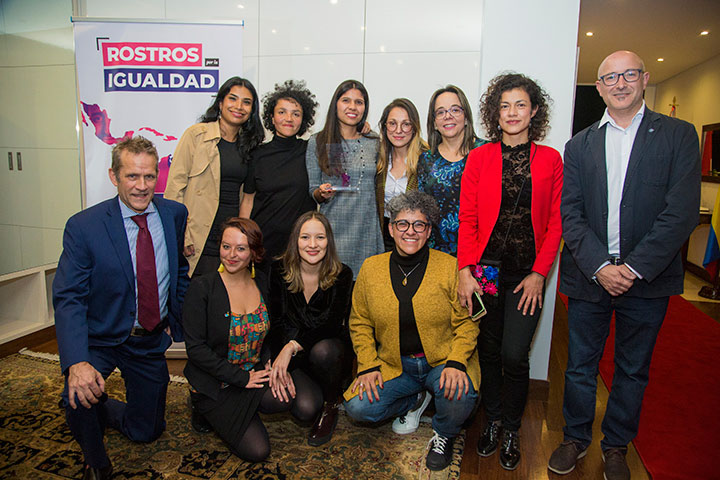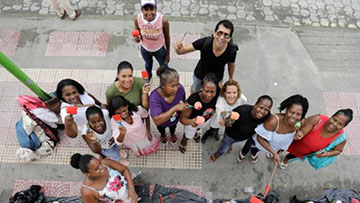Canada highlights women's work for gender equality in Colombia
Canada in Colombia
Gender equality
March 2019
Canada acknowledged and highlighted the work of the Mesa por la Vida y la Salud de las Mujeres, afro descendant leader Rosario “Charo” Mina-Rojas, and the online gender channel Las Igualadas.
The Human Rights Leader Award is a regional initiative of the Government of Canada to recognize, highlight and bring visibility to the work that organizations carry out for gender equality and women’s and girls’ rights.
In the second edition of the Regional Human Rights Leaders Awards, Canada acknowledged and highlighted the work of Mesa por la Vida y la Salud de las Mujeres, afro descendant leader Rosario “Charo” Mina-Rojas, and the online gender channel, Las Igualadas, for their efforts in gender equality and women empowerment in Colombia.
 Afro descendant leader Charo Mina Rojas and Ambassador Marcel Lebleu.
Afro descendant leader Charo Mina Rojas and Ambassador Marcel Lebleu.The event to recognize the work of the three nominated organizations was held on March 7, 2019, at the Official Residence of Canada and hosted by Ambassador Marcel Lebleu, who highlighted the diversity of the work done by the organizations nominated for the Regional Human Rights Leader Award. Ambassador Lebleu acknowledged that despite the progress made on gender equality, “there is still a lot to be done.” He said, “We have gender-balanced cabinets in both Canada and Colombia, but the political participation of women in parliament is still low. The same applies to the private sector. As the Colombian expression says, you cannot win a game when 50% of the players are not on the field.”
Charo Mina-Rojas is part of the Proceso de Comunidades Negras-PCN, a social leader whose work focuses on the defense of the self-determination and collective rights of afro descendant communities and women. According to the social leader, “between 2008 and 2010 the violence against women in Afro-descendant territories increased, with quite strong patterns of violence. However, we were still talking about generalized violence and we were making this particular violence invisible. That was when we created the Afro-Colombian Women Defenders of Human Rights, with a racial-ethnic approach focused on women, where identity, autonomy, participation and the voices of women are promoted.”.
 From left to right: Mariángela Urbina, Ambassador Marcel Lebleu, Viviana Bohórquez and Juan Carlos Rincón.
From left to right: Mariángela Urbina, Ambassador Marcel Lebleu, Viviana Bohórquez and Juan Carlos Rincón.In just two years, Las Igualadas has become the gender channel on YouTube with the most followers in Latin America. Its purpose is to confront hate speech and disinformation on gender issues. “Las Igualadas was born two years ago and our motivation was to talk about gender issues in a non-confrontational and rational manner,” explained Viviana Bohórquez, co-creator of Las Igualadas along with Mariángela Urbina and Juan Carlos Rincón. “That means educating and challenging misinformation, getting women to recognize that feminism is a very important tool for their lives, that it frees us from violence, it makes us recognize discrimination, it makes us freer, it gives us tools for our school and work life. Our channel is aimed at girls and adolescents. 70% of our audience are women and the goal is simply to reach them with feminist tools to live a freer life, with less violence and discrimination, and if they face it, to be brave enough to denounce it. Of course that will depend on each woman.” The presence of this channel in the online version of El Espectador, Colombia’s oldest newspaper, has fostered a fundamental conversation within the mainstream press about the importance of women’s voices in the discussion of gender issues.
The Mesa por la Vida y la Salud de las Mujeres, recipient of the 2019 Human Rights Leader Award, is a platform of organizations that works to guarantee women's sexual and reproductive health rights. “We defend sexual and reproductive health rights, especially the right to abortion, because we are convinced that it is a fundamental right for the recognition of women as equal citizens,” explained the coordinator of the collective, Juliana Martinez.
 Members of the Mesa por la Vida y la Salud de las Mujeres with Ambassador Marcel Lebleu.
Members of the Mesa por la Vida y la Salud de las Mujeres with Ambassador Marcel Lebleu.Upon receiving the award, Juliana expressed her gratitude to the Embassy of Canada in Colombia for the “assertion that gender equality is an asset of human kind and especially for the recognition of our work.” Ms. Martinez added, “We receive this award with great joy, with great pride and also with great humility for several reasons: First, because it reaffirms our struggle, the right of women to decide about their bodies, which is a democratic struggle. The right to abortion is a first-order right, a priority right, and we cannot wait any longer to guarantee it. Our equality as citizens depends on it. Second, last year we celebrated 20 years of activities and struggles. This award is an accolade that motivates and encourages us. Finally, when meeting the other nominees, Las Igualadas, with whom we have worked, and Charo Mina, we feel that the struggle for equality, the feminist cause, is a living force which has many allies. We hope to continue receiving the support of all of you, of the international community and with this award, we renew our commitment to women so that they have choice and full control over their own bodies.”
The Human Rights Leader Award is a regional initiative of the Government of Canada to recognize, highlight and bring visibility to the work that organizations carry out for gender equality and women’s and girls’ rights.
Related Links
- Date Modified:



